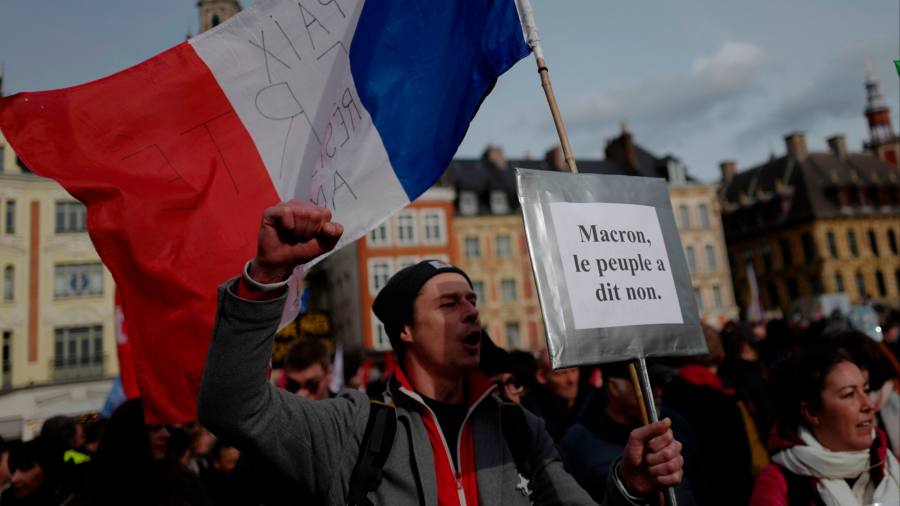
Emmanuel Macron faces a critical parliamentary test on Thursday over his unpopular plan to raise the retirement age, as MPs vote against the backdrop of strikes, uncollected rubbish, and nationwide protests.
Lawmakers are scheduled to decide on the pensions reform bill after two months of fractious debate, with the outcome too close to call despite government efforts to rally support from the conservative Les Républicains.
“This reform is necessary, and it has been improved by the work of this body,” said prime minister Élisabeth Borne on Wednesday. “Our government is totally mobilised to win a majority of votes for it in the coming days.”
Nearly three-quarters of the public are opposed to raising the retirement age, according to polls, and millions have turned up at protests, not only in Paris and big cities but also in small towns. This week, walkouts by bin collectors left 7,000 tonnes of rubbish on the streets of Paris, trains and flights were disrupted, and workers at nuclear power plants dialled down electricity production.
The travails of the pension reform are a sign of how Macron’s second-term agenda has been complicated by his party losing legislative elections in June. His centrist alliance has 250 MPs so it needs to win over opposition politicians to reach 289 votes, or convince some to abstain to secure to a majority.
The president has staked his reformist credentials on pensions reform, which would raise the retirement age to 64 and also require 43 years of work to qualify for a full pension. Failure risks turning him into a lame duck on domestic matters with four years left in his term, although he could still lead on foreign policy and on the EU stage.
He has argued that the change is needed to protect the viability of France’s pension system, which relies on current workers to fund payments to retirees. Otherwise, deficits would balloon as the population ages.
Labour unions remain staunchly opposed, arguing that changing age thresholds unfairly hurts women and the least well-off, in particular those who began working early without going to college.
Among the opposition, the leftwing Nupes alliance and Marine Le Pen’s far-right National Rally party are also against raising the retirement age and instead call for tax hikes to plug pensions deficits.
That left Borne with little choice but to court Les Républicains, who have long supported raising the retirement age to 65 out of desire to clean up public finances. Borne successfully brokered a deal with LR party leaders, but then a rebel faction emerged among the 61 MPs, which has left the vote too close to call.
The government does have the power to override lawmakers and pass legislation by decree under what is known as article 49.3 of the French constitution, but such a move risks touching off a political crisis and radicalising the street protests.
“We will continue the fight no matter what,” said Philippe Martinez, who heads the hardline CGT union.
If it is to use the 49.3 tactic, the government must invoke it before the vote in the National Assembly on Thursday afternoon. Triggering it also permits the opposition to respond with a no-confidence motion.
The government has already resorted to using the 49.3 ten times during this parliamentary session, making it the second-most frequent user of the tactic since 1958 when the Fifth Republic began.
Bruno Retailleau, the LR leader in the Senate leader, said Borne faced a difficult choice. “It’s like playing Russian roulette to go to a vote if you don’t know if you have a majority, or you can bring out the big gun with the 49.3,” he said on France Inter. “But better to use the 49.3 than not pass the reform at all.”